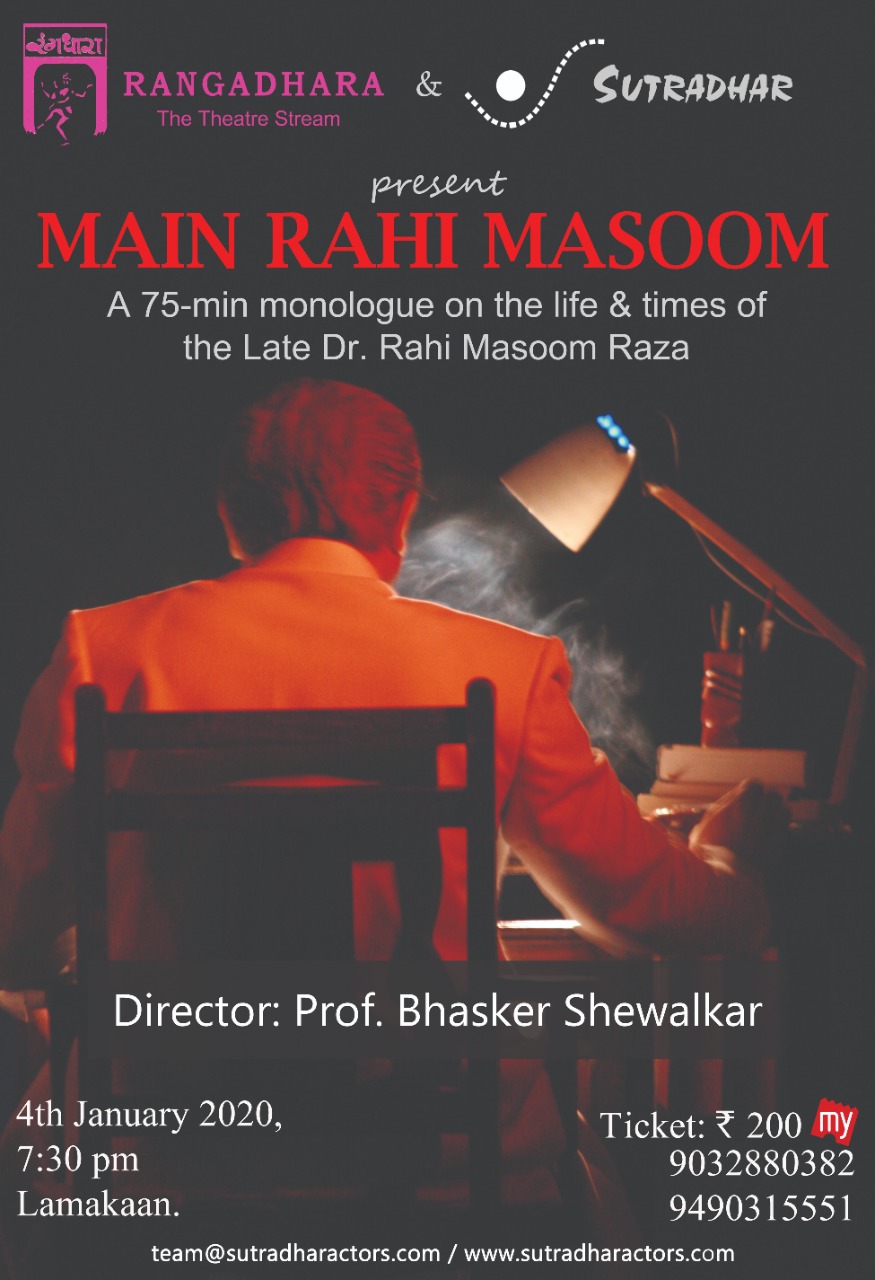«Prev From Feb 13, '26 to Mar 15, '26 Next»

6650
Main Rahi Masoom
Sat Jan 4, 7:30 PM
Sutradhar
About the play:
MAIN RAHI MASOOM, a solo performance enacted by Vinay Varma and directed by Prof. Bhaskar Shewalkar is a biographical sketch of the famous Hindi and Urdu writer, the Late Dr. Rahi Masoom Raza. This performance is first of its kind on Rahi.
This 70-minute poignant monologue shows how Rahi detested communal and vote-bank politics, and how he fought against the divisive forces in the country through his writings. He was a strong nationalist first and a Muslim next. He also staunchly opposed pseudo-secularism. Sample this: “main ek Hindustani musalman hoon aur iske siva meri aur koee pehchaan naheen hai” or “vatan mazhab nahin jo badla ja sake”. He was upfront against the fundamentalists on both sides of the divide. He was brutally honest regarding politics of hatred, and felt that the interest of communal elements among both Hindus and Muslims lies in keeping the two communities aloof from each other and to create distrust among them”…sampradaaikta(communalism) ka koee dharm nain hota” or “zahid-e-tang nazar ne mujhe kaafir jaana aur kaafir ye samajhta hai ki musalman hoon main……”
The monologue ends with Rahi’s rare nazm Vaseeyat.
Rahi’s journey begins on 1st September, 1927 in Gangauli, a small village in the Ghazipur district of Uttar Pradesh and ends with his vaseeyat in which he wills that he be laid to rest in the lap of Ganga, whom he considered his second mother. He passed away on 15 March 1992.
During his illustrious career, Rahi Masoom Raza has written lyrics, dialogues and stories for various movies and television series. His high came with the telecast of TV series 'Mahabharat' that was based on the Hindu epic Mahabharat. Rahi, a Muslim, wrote the screenplay and dialogue of the TV series that went on to become the most watched TV series in India. At one time, its TRP was a staggering 86 %. This was a triumph for Rahi as some Hindu zealots had criticized his inclusion in the team. Terms of address like “Matashri”, “Pitashri”, “Bhratashri”, and “Jijashri” etc. were brought into the popular realm by Rahi.
MAIN RAHI MASOOM, a solo performance enacted by Vinay Varma and directed by Prof. Bhaskar Shewalkar is a biographical sketch of the famous Hindi and Urdu writer, the Late Dr. Rahi Masoom Raza. This performance is first of its kind on Rahi.
This 70-minute poignant monologue shows how Rahi detested communal and vote-bank politics, and how he fought against the divisive forces in the country through his writings. He was a strong nationalist first and a Muslim next. He also staunchly opposed pseudo-secularism. Sample this: “main ek Hindustani musalman hoon aur iske siva meri aur koee pehchaan naheen hai” or “vatan mazhab nahin jo badla ja sake”. He was upfront against the fundamentalists on both sides of the divide. He was brutally honest regarding politics of hatred, and felt that the interest of communal elements among both Hindus and Muslims lies in keeping the two communities aloof from each other and to create distrust among them”…sampradaaikta(communalism) ka koee dharm nain hota” or “zahid-e-tang nazar ne mujhe kaafir jaana aur kaafir ye samajhta hai ki musalman hoon main……”
The monologue ends with Rahi’s rare nazm Vaseeyat.
Rahi’s journey begins on 1st September, 1927 in Gangauli, a small village in the Ghazipur district of Uttar Pradesh and ends with his vaseeyat in which he wills that he be laid to rest in the lap of Ganga, whom he considered his second mother. He passed away on 15 March 1992.
During his illustrious career, Rahi Masoom Raza has written lyrics, dialogues and stories for various movies and television series. His high came with the telecast of TV series 'Mahabharat' that was based on the Hindu epic Mahabharat. Rahi, a Muslim, wrote the screenplay and dialogue of the TV series that went on to become the most watched TV series in India. At one time, its TRP was a staggering 86 %. This was a triumph for Rahi as some Hindu zealots had criticized his inclusion in the team. Terms of address like “Matashri”, “Pitashri”, “Bhratashri”, and “Jijashri” etc. were brought into the popular realm by Rahi.

